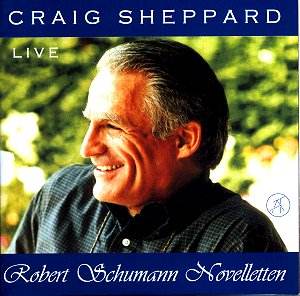AVAILABILITY
Contact Annette Tangermann at
Friedenstrasse 16,
D-14109 Berlin
at-label@gmx.de
Returning empty handed from my shelves I looked
up the Novelletten in the latest RED Classical Catalogue I have.
There are currently very few recordings of the set available;
Engel, Brautigam, Demidenko and Rössler are the quartet listed
though Rubinstein held sway with the set and Richter used to play
selections (he once programmed three in a recital but he never
recorded them all, more’s the pity). One who recorded No. 2 was
Clara Schumann pupil Adelina de Lara, whose very late 1952 recordings
are on Pearl (No. 8 is advertised as well but I’ve yet to locate
it). She was over eighty at the time so points of comparison with
Craig Sheppard are not entirely fair but comparison is certainly
revealing. She hadn’t the fingers really and the relatively primitive
set-up tends to coarsen the recording quality. By contrast Sheppard
receives a notably attractive and warm acoustic. De Lara begins
with precipitous energy, driving and visceral, making a paragraphal
caesura for the lyrical subject that Sheppard manages to integrate
into the melodic curve with a degree of seamlessness.
Sheppard’s is in fact a most compelling traversal
of a greatly under-appreciated set, once habitually dismissed
for mere note-spinning and flummery. In truth along with the undoubted
virtuosity comes lyrical invention of the highest order. It also
has many a rhythmic fancy – take the saucily launched Polonaise
of No. 5 which here receives just the right sense of rhythmic
brio and control (equal constituents). He can withdraw his tone
to the optimum expressive advantage of the piece and his clarity
and agility are memorably fluent. He draws out melodic strands
embedded in these eight individual movements but never with self-conscious
pointing. Things emerge with lyrical generosity but also with
a sense of inevitable rightness – of weight and of direction (the
conclusion of No. 5 is indeed measured to perfection with all
its hesitational subtleties intact to the last). The example of
the Sheppard/de Lara divergence illustrates one aspect of his
structural priorities. How well, to cite another instance, Sheppard
conveys the melodic line’s fluctuation between left and right
hand in No. 6. How insightful and complex is his reaction to No.
8, the romanticism tinged and heightened with shafts of recollections
of Clara’s Stimme aus der Ferne – where Sheppard reveals
the apex of his sensibility and poetic instincts.
His own notes are succinct and as I said the
sound quality is immediately and lastingly attractive. It’s apparent
that the action on Sheppard’s piano is a touch noisy but that’s
a minor point judged against such a wealth of affectionate intelligence
and tonal allure. The set takes its place as a most warmly recommendable
release and comes complete with two encores – an excellent Blumenstück
and a delicate, slow and most refined Träumerei, both
of which add to the very real merits of this disc.
Jonathan Woolf
see also reviews by Chris
Howell and Roy Brewer

